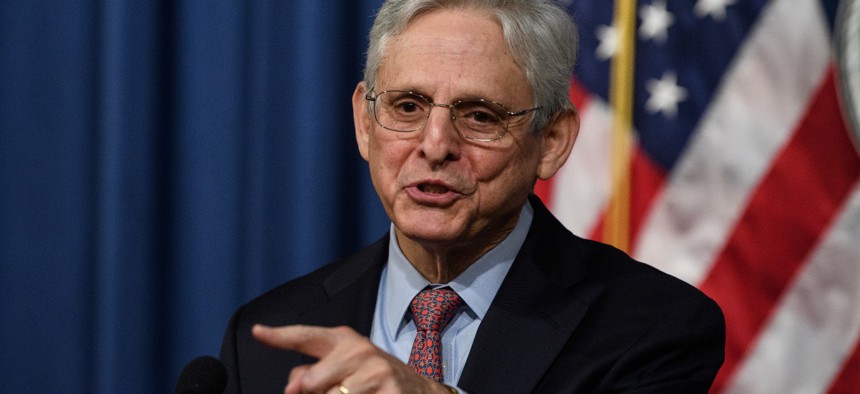
Pool/Getty Images
DOJ’s New FOIA Guidance Promotes Openness
The new guidelines follow bipartisan calls from lawmakers for updates.
The Justice Department is directing federal agencies to promote openness in processing records requests.
On Tuesday, Attorney General Merrick Garland issued a guidance memo on the Freedom of Information Act to heads of the executive departments and agencies. The new guidelines came one day before “Freedom of Information Day” and during “National Sunshine Week,” which promotes open government.
“The attorney general’s new FOIA guidelines underscore the Justice Department’s commitment to [a] government that is open, transparent and accountable to the people we serve,” said Associate Attorney General Vanita Gupta, who also serves as the department’s Chief FOIA Officer, in a statement. “The Office of Information Policy looks forward to working with agencies to ensure the presumption of openness is applied across the government.”
In July 2016, President Obama signed a law that codified the “presumption of openness” that he championed during his first year in office and later received mixed reviews on, as Government Executive reported in 2015.
The new guidance from Garland follows Obama’s goals of a “presumption of openness” and directs agencies “make it clear that the Justice Department will not defend nondisclosure decisions that fail to do so,” said the Justice Department.
According to the Government Accountability Office, agencies’ use of (b)(3) exemptions – a provision of the Freedom of Information Act that allows agencies to apply other statutes when denying records requests –more than doubled between fiscal year 2012 and fiscal year 2019, meanwhile the number of FOIA requests processed increased by 32%.
The new guidance also stresses that proactive disclosures of documents and information are “fundamental to the faithful application of FOIA;” promotes timeliness of responses; and encourages agencies to continue removing barriers to requesting and accessing records as well as reducing their FOIA backlogs.
GAO found that FOIA request backlogs increased by 18% from fiscal year 2019 to fiscal 2020, which was the first year of the COVID-19 pandemic, and backlogged requests have generally been increasing since fiscal 2016. The watchdog also found that from fiscal year 2012 to fiscal year 2020, the backlog of appeals increased by 63%.
Lastly, “I urge agency Chief FOIA Officers to undertake comprehensive reviews of all aspects of their agencies' FOIA administration, with a particular focus on the concerns highlighted in this memorandum,” wrote Garland in the memo. Additionally, “I encourage each agency head to provide regular and proper training to your workforce that explains the importance of FOIA and every individual's role in administering it.”
In January, a diverse group of 25 organizations urged Garland to take action to “implement a ‘generous’ reading of FOIA” as he testified during his confirmation hearing, such as by issuing updated guidance. The co-signers noted he hadn’t taken any meaningful action on FOIA since getting sworn in in March 2021.
Then last month, a bipartisan group of six lawmakers wrote to Garland and asked him to issue a memo to all agencies encouraging them to emphasize “openness and transparency” as well as outline any steps the Justice Department is taking to implement recommendations from GAO on proactive disclosures and reporting requirements.
“As the Biden administration begins its second full year, the need for guidance becomes increasingly urgent,” wrote the chairs and ranking members of the House Oversight Committee and Senate Judiciary Committee as well as Sens. Patrick Leahy, D-Vt., and John Cornyn, R-Texas.
“I am pleased that Attorney General Garland responded quickly to the bipartisan, bicameral request I led to issue FOIA guidance that emphasizes openness and transparency,” said Rep. Carolyn Maloney, D-N.Y., chair of the House Oversight and Reform Committee, in a statement provided to Government Executive. The “new guidance will help ensure that agencies fully comply with FOIA, making our government more transparent to the American people.” She also vowed to continue working to improve FOIA administration with her committee.
“The American people deserve an open and transparent government,” Rep. James Comer, R-Ky., ranking member on the committee, said in a statement to Government Executive. “We’re finally getting results” following the letter last month.
“Attorney General Garland’s long overdue FOIA guidance encourages agencies to fully comply with the law,” Comer continued. “As ranking member of the House Committee on Oversight and Reform, I will continue fighting for a more efficient and transparent federal government.”
Ginger Quintero-McCall, legal director at Demand Progress, a grassroots organization that works to hold the government accountable and combat concentrated corporate power, said "while we appreciate the administration's belated acknowledgement of the importance of FOIA and commitment to a presumption of openness, we have seen similar messages issued by prior administrations without any real measurable improvements in FOIA and timely disclosure.”
Therefore, “in order to ensure greater transparency, this administration needs to commit greater resources to FOIA offices and commit to supporting legislative reforms including a public interest balancing test, rolling back the harmful Argus Leader Supreme Court ruling, and ensuring transparency of Office of Legal Counsel opinions,” she added.
The Argus Leader ruling made it easier for the government to withhold certain information from the public that businesses do not want disclosed, which reversed decades of precedent, partners from the law firm Crowell & Moring LLP explained. In the majority decision, the court rejected a test established in a 1974 decision.
The guidance is “a welcome push to the executive branch for better compliance with what FOIA already requires,” said Dan Schwager, chief counsel at American Oversight, a nonprofit watchdog that uses public records requests and litigation to hold governments accountable.
“We also welcome the spirit of cooperation with the requesting community that the AG promises. However, many agencies and departments still have a long way to go to adhere to their FOIA obligations and uphold basic principles of an accountable government,” he continued. “We hope DOJ will live up to this directive and push their agency clients to develop a culture of compliance that can last across administrations.”







